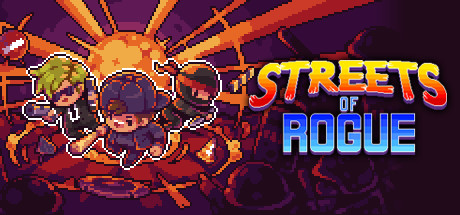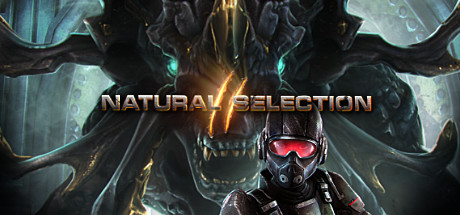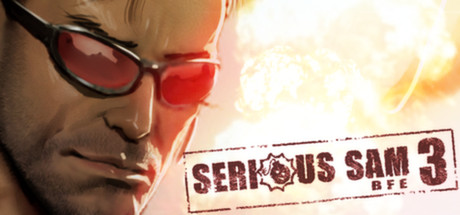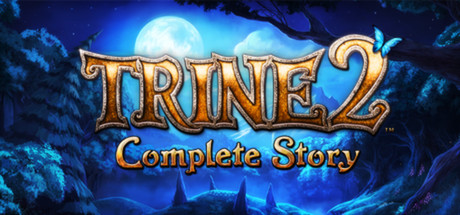Streets of Rogue Reviews
Fight, sneak, and hack your way through randomly generated cities. It's like Nuclear Throne meets Deus Ex, mixed with the anarchy of GTA. Rogue-lite meets immersive sim, and goes completely insane.
| App ID | 512900 |
| App Type | GAME |
| Developers | Matt Dabrowski |
| Publishers | tinyBuild |
| Categories | Single-player, Steam Achievements, Steam Cloud, Multi-player, PvP, Online PvP, Co-op, Online Co-op, Full controller support, Shared/Split Screen Co-op, Shared/Split Screen, Remote Play Together, LAN Co-op, Cross-Platform Multiplayer, LAN PvP, Shared/Split Screen PvP, Remote Play on TV, Steam Trading Cards, Steam Workshop, Remote Play on Phone, Remote Play on Tablet, Includes level editor |
| Genres | Indie, Action, RPG, Adventure |
| Release Date | 12 Jul, 2019 |
| Platforms | Windows, Mac, Linux |
| Supported Languages | English, Portuguese - Brazil, French, German, Spanish - Spain, Simplified Chinese, Russian, Korean |

21 933 Total Reviews
21 076 Positive Reviews
857 Negative Reviews
Very Positive Score
Streets of Rogue has garnered a total of 21 933 reviews, with 21 076 positive reviews and 857 negative reviews, resulting in a ‘Very Positive’ overall score.
Reviews Chart
Chart above illustrates the trend of feedback for Streets of Rogue over time, showcasing the dynamic changes in player opinions as new updates and features have been introduced. This visual representation helps to understand the game's reception and how it has evolved.
Recent Steam Reviews
This section displays the 10 most recent Steam reviews for the game, showcasing a mix of player experiences and sentiments. Each review summary includes the total playtime along with the number of thumbs-up and thumbs-down reactions, clearly indicating the community's feedback
Playtime:
17017 minutes
Streets of Rogue takes a unique approach when facing the roguelike genre (or “rogue-lite” if you’re choosy) and providing a sense of agency and variety the likes I have yet to encounter from any of its cohorts. The range of choice less so comes from the number of different objectives available in the game found in each level – frankly, it’s a small selection – but rather what the classes the player can choose from are able to do to accomplish them, where these objectives are located in the randomly generated levelling format, and the assortment of items – which range from a mysterious syringe, a rocket launcher, or even a delicious banana – that can be found by looting, purchasing, or earning them by any means necessary (or unnecessary): for example, the objective that incentivises retrieving an item from an NPC, my personal favourite, permits the player to bribe them with money or an item on their person, or taking their chances by threatening them for it, or just simply taking it from their cold, dead hands. Alternatively, depending on which class they’re playing as, or if they have the right tool for the job, they could utilise the class’s inherent abilities or arsenal to obtain it, which is indeed an expansive list, or use the items they have acquired in the same run, regardless of their class. The customization also enhances replay value, from choosing a list of “mutators” that provide unique gameplay characteristics for a set run and can be picked and combined to provide different experiences, to using the modular character customization that provides the game’s abilities, passive traits and items to not only allow creation of an entirely new character but, potentially, a new approach in gameplay different from the predetermined classes. I could continue writing about the range of options and flexibility available at the player’s disposal, but it might be too long to squeeze into a “brief” review: in retrospect, it is a game that manages to strike a balance between the fast-paced gameplay and excitement found in an action roguelike with the methodical strategy and agency found in an RPG; regardless of how the player may approach the game as described, they will be greatly rewarded, more so if both aspects are applied proficiently – at worst, it’s something you could visit on occasion and play a game or two in a sitting, as it will still provide something new and fulfilling for each visit, a signature aspect of the best roguelikes in the market.
Here are my qualms with what I would otherwise consider a masterpiece ([u]Some slight gameplay/story spoilers going forward[/u]):
[h2] Disasters [/h2]
Once every few levels, the player will be presented with a “Disaster”, a mechanic which encourages the player to change their method of approach by presenting a unique challenge. This ranges from the bounty that makes it seem like the level will play out like any other before it, until the player happens upon a hobo peppering them with the shotgun they just brandished, to a zombie outbreak that plagues the level's populace and may turn unfortunate denizens into zombies the player must also brave. The disasters aren’t a bad idea in of itself – it’s a much needed change of pace – nor is the execution for some of them terribly done. They are all too different to be judged as a whole, but generally, the one indiscretion I have with them all is that they don’t present the player with a means to circumvent them – at best it’s a tedious chore to do so and at worst it’s impossible to avert. Does your level [spoiler]have the war zone disaster? Are the cannibals giving you too much grief to properly progress? Maybe you could put your current objective aside to avert the disaster in some way, like sealing the holes that they come out of – Nope, too bad, you just have to play the level as you were and kill the boundless wave of cannibals that attack you who drop nothing of value and Swiss-cheese you whenever you cross their path. Is the killer robot proving too much trouble? Perhaps there’s a way you can dispose of it quickly and efficiently without resorting to chipping away at its obscenely grand health pool at a snail’s pace – suck it up, little man, you can still try, but it has to be the slow monotonous way – nobody will help you either, they’ll just either look on in stunned silence and or scamper at the sight of it.[/spoiler]
In hindsight, the disasters that can be subverted have no way to streamline the mission or have the opportunity to potentially provide a new gameplay experience, and the ones that can’t be subverted make it difficult not to blame the game’s faulty mechanics over the player’s set of skills.
[h2] The NPC AI is too clever [/h2]
I understand the need to make the AI smart enough to encourage difficulty, particularly when engaging in combat – in fact, I agree with it. The issue comes from the fact that the depth in which they operate extends as far as whether an NPC runs from the player or not; everybody is a tactical genius with lightning reflexes – [b]every single body[/b]. The goon or soldier that are trained and prepared to adjust to such situations are equal in reflexes and combat intelligence as a handful of angry monkeys that just broke out of a barrel. There’s one instance of this that I have encountered first hand and I cannot forget it (tangent ahead): I was getting chased by a zombie and hoped to avoid fighting in the moment, so I had some paralyzer traps handy and threw one over to ideally stop it in its tracks; the zombie had the foresight to see me throw it and managed to bat it away and not be affected, continuing the chase – [b]a fucking zombie[/b], a mindless shell of a human that pursues the intelligent lifeform nearest to them relentlessly. It’s like if Rick Grimes went to shoot a zombie point blank only to have it successfully disarm him, jab his throat then follow up with a roundhouse kick.
[h2] The Epilogue [/h2]
This is more of a nitpick with the epilogue you are met with at the end of a successful run than a gameplay criticism. I don’t take issue with the ending itself – there needs to be an explanation to maintain continuity for a game that seemingly sees no true end. Why is it that every character’s story ends with “[spoiler]They become a corrupt official[/spoiler]”? There can be so much to explore with the different classes and how their mayoral campaign ends – for example, [spoiler]the Doctor realises that having a murder-free city is nigh impossible to lift off the ground and the denizens mistake it for kindness to take advantage of, effectively having them leave the city entirely and the position for mayor up for grabs; the Gangster has a chance encounter with the sauce man that killed their father and, shortly after realising their motivation to join a gang was but a farce, gets tragically killed in his frenzy; the Gorilla could just have the text replace “bacon cheeseburgers” with “bananas”, nothing more[/spoiler]. I could excuse the custom characters not having anything different, but there’s so much to explore with all the different predetermined classes in that regard. They each get their own mayoral speech, so why stop there?
(End of spoilers)
I want to address these criticisms because I love this game to smithereens, and I hope that, if seen, Matt will consider them for the upcoming sequel (which I am also excited for), should they be implemented – I also hope that said criticisms haven’t dissuaded any potential buyers. If you’re still on the fence, get it on sale, the discount is massive enough that you will not regret the purchase in the slightest – it’s worth checking out.
👍 : 0 |
😃 : 0
Positive
Playtime:
1219 minutes
Good silly fun and mayhem, in-game mods / mutators to switch up gameplay with a range of characters with different perks and abilities, decent tunes. On sale it is an absolute bargain.
👍 : 0 |
😃 : 0
Positive
Playtime:
2118 minutes
A very elegant collection of antisocial mechanics for breaking things, sneaking around, shooting guns and beating people up, wrapped up in the roguelike format promised in the title. The tuning is really enjoyable: The different character types have some nice built-in tools for navigating the world, the items and perks give every run a unique feel, and the mechanics combine in chaotic ways. It's got the secret sauce that makes a roguelike so enjoyable run after run.
👍 : 0 |
😃 : 0
Positive
Playtime:
1884 minutes
One of the best rougelikes on Steam. Tons of different play-styles, difficult game play that never gets old, and a ton of charm.
👍 : 0 |
😃 : 0
Positive
Playtime:
3825 minutes
Amazing sound work sick old school grafics you can do anything you have sooooo much freedom or if you want guide lines you can do quests big quests daily runs and so much more theres super witty things and refrences and some of the most creative things ive seen ive played over 5000 hours on my old account and i know i shold touch grass tho with a game like this its impossible
Look ill be honest i go on and off games tho the only games ive never stoped playing is minecraft and streets of rouge ive played it for 5 years more or less
SO BASICLY PLAY THIS GAME
👍 : 2 |
😃 : 0
Positive
Playtime:
279 minutes
Great roguelite focused on varied gameplay and approaches to obstacles.
👍 : 1 |
😃 : 0
Positive
Playtime:
8442 minutes
pretty basic game, but still fun, can't wait for the sequel, just hope that they don't screw it up.
👍 : 1 |
😃 : 0
Positive
Playtime:
2558 minutes
+Excellent Co-op mayhem!
+Runs well on almost any machine!
-It uses Epic for servers now, and its bad.
👍 : 2 |
😃 : 0
Positive
Playtime:
1516 minutes
I enjoyed this game both in single-player and multi-player. Amazing!
So many different characters and approaches, so many great combinations.
The game is deeply enthralling
👍 : 1 |
😃 : 0
Positive
Playtime:
1136 minutes
Streets of Rogue is a wildly inventive and chaotic action-roguelite that combines the spirit of immersive sims with the fast pace and unpredictability of procedural generation. Developed by Matt Dabrowski, the game takes inspiration from titles like Deus Ex, Nuclear Throne, and The Binding of Isaac, but it carves out its own unique identity through sheer creativity and freedom. Set in a dystopian city where a corrupt mayor rules with an iron fist, players fight their way through multiple procedurally generated neighborhoods, each filled with hazards, quests, and unpredictable interactions. But what truly sets Streets of Rogue apart is its sandbox-style gameplay, where nearly every object, character, and system can be manipulated to your advantage—or blown up in hilarious fashion.
At the heart of the game is its extensive character class system, with dozens of unique roles ranging from soldier and hacker to vampire, comedian, and even a gorilla. Each character plays drastically differently, with abilities that change how you approach every situation. Want to hack into computers and deactivate security systems? Play as the hacker. Prefer brute force and explosions? The soldier is for you. Looking to possess other characters? Try the shapeshifter. This class variety, combined with RPG-style upgrades, permanent unlocks, and randomized levels, gives Streets of Rogue a high replay value that few indie games can match.
Gameplay in Streets of Rogue is driven by emergent storytelling and problem-solving. Every level presents objectives—like rescuing a hostage, stealing an item, or neutralizing a target—but how you accomplish those tasks is up to you. You can sneak through ventilation ducts, bribe guards, blow up walls, or infect an entire building with a virus and watch the chaos unfold. The game encourages experimentation, and it rarely punishes creative solutions, which makes each run feel fresh and uniquely yours. The physics system, environmental interactions, and AI behavior combine to create hilarious and often surprising results, making even failed runs memorable.
Co-op mode is where the chaos truly shines. Up to four players can join forces locally or online, and the overlapping abilities, competing objectives, and sheer unpredictability of the city often lead to joyful anarchy. Friendly fire is on by default, which adds both comedic tension and the occasional accidental betrayal. The dynamic environments, layered objectives, and freeform approach make multiplayer a highlight that significantly enhances the game's longevity and replayability.
Visually, Streets of Rogue embraces a retro pixel-art style that fits its tone perfectly. While it doesn’t aim for detailed realism, its expressive characters, colorful environments, and clear visual cues keep the action readable amid the chaos. The soundtrack complements the gameplay with energetic, synth-driven beats that reinforce the game’s futuristic, tongue-in-cheek vibe. Combined with quirky dialogue and sharp humor, the game’s presentation is consistently charming and self-aware without being overbearing.
Despite its many strengths, Streets of Rogue isn’t without minor flaws. The procedural generation, while often excellent, can sometimes lead to uneven difficulty spikes or awkward mission placements. The learning curve can also feel steep for new players, especially given how many mechanics are at play from the start. Still, these issues are small compared to the overall experience, and the game includes customizable difficulty and rule sets to accommodate different play styles and preferences.
In conclusion, Streets of Rogue is an ambitious and wildly entertaining roguelite that rewards creativity, chaos, and experimentation. With its robust class system, endlessly replayable gameplay, and hilarious emergent moments, it offers a uniquely sandbox experience in a genre that often leans toward repetition. Whether you're playing solo or with friends, the game delivers consistently fresh and often hilarious scenarios that make every run feel distinct. For players who love freedom, humor, and mayhem wrapped in a pixel-art package, Streets of Rogue is a must-play indie gem.
Rating: 9/10
👍 : 5 |
😃 : 0
Positive







